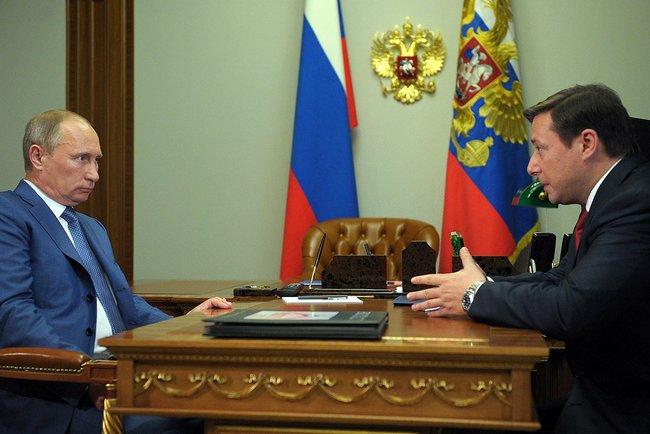
North Caucasus Tourism Project Is Failing Where It Is Needed Most
Publication: Eurasia Daily Monitor Volume: 10 Issue: 139
By:

On July 27, President Vladimir Putin met in Moscow with Aleksandr Khloponin, his plenipotentiary representative in the North Caucasian Federal District. Khloponin informed the Russian president about his work to improve the socio-economic and political situation in this volatile region (https://kremlin.ru/news/16066). He boasted of cutting the unemployment rate in the North Caucasus by a whopping 40 percent over the past three years, from nearly 500,000 unemployed in 2010 to 300,000 in 2013. At the same time, he gave a widely ranging estimate of the number of jobs created in the same period—between 11,000 and 45,000 (https://kavpolit.com/kak-pozhivaet-skfo).
Russian state statistics are notoriously unreliable. For example, the official website of the Ministry for Regional Development says the unemployment rate in Dagestan in July 2013 was under 5 percent and that only Ingushetia and Chechnya have high unemployment rates—23 percent and 59 percent, respectively (https://www.minregion.ru/north_caucasian/). If the employment situation in Dagestan were as good as the official website claims, then it is unclear why the republican authorities have been so concerned about the high unemployment rate in Dagestan. In addition, Khloponin’s mission also loses its purpose if the economy in the deadliest republic of the North Caucasus is doing so well because that would mean economic conditions, including the unemployment rate, have nothing to do with the intensity of violent insurrection.
The meeting between President Putin and his representative Khloponin illuminated a less advertised side of Khloponin’s activities. The president’s representative in the North Caucasus reported that his office had paved the way for setting up the so-called North Caucasian Federal University, with its main campus in the city of Stavropol. According to Khloponin, the newly created university has the capacity to accommodate 37,000 students and is fully financed by the Russian government (https://kremlin.ru/news/16066). The university is apparently an attempt by the Russian government to wield “soft power” in the North Caucasus (https://www.ncfu.ru), given that North Caucasian educational institutions are regarded as breeders of regional nationalism. As the new university draws young people from the North Caucasus and prepares them according to Moscow’s wishes, the hope is that they will go back to their respective republics and influence them in certain desirable ways. While there is nothing wrong with this old tool of education per se, this approach certainly faces obstacles. A primary one is that local Russians in Stavropol are already wary of North Caucasian youth on their territory. Bringing in even more North Caucasian youth hardly will make the situation in the region better for anyone. As for the North Caucasian young people, years of study in a hostile environment increasingly influenced by Russian nationalism may have exactly the opposite effect on them than what Moscow is hoping for.
The Russian government and the North Caucasian Federal District’s administration assert they are continuing to press ahead with the project to build world-class ski resorts across the region. The new head of the state company that oversees the project, Sergei Vereshagin, said it would start with ski resorts in Karachaevo-Cherkessia, Kabardino-Balkaria and North Ossetia. The resorts in these three republics would be followed by a similar project in Dagestan that would combine a seaside resort area with ski resorts and similar development projects in Ingushetia and Adygea. Vereshagin did not mention any ongoing projects in Chechnya, even though it was previously announced that the Veduchi resort in Chechnya would also be included into the investment portfolio of the North Caucasian Resorts company (https://ria.ru/interview/20130726/952232100.html). It appears that the frequently rumored tensions between Khloponin and Chechnya’s strongman Ramzan Kadyrov resulted in the postponement of investment in Chechnya’s tourist infrastructure. In July, the Veduchi project was still being “streamlined by the Russian government,” which is apparently a euphemism for the struggle between bureaucrats in Moscow and Kadyrov (https://www.ncrc.ru/ru/news/aleksandr-hloponin-obsudil-s-rukovodstvom-oao-ksk-i-skfu-kadrovoe-obespechenie-turisticheskogo).
Meanwhile, locals in Dagestan have expressed their unwillingness to relinquish land for the ski resort project in the republic. Earlier reports suggested there was a bitter struggle between the North Caucasus Resorts Company and the republican government in Kabardino-Balkaria. The project of building resorts is apparently becoming fragmented as it advances in those areas where there was previous ski resort infrastructure and stalling in those areas where there was no developed tourist business. So the ski resorts project seems to be bound to crowd out local small businesses and create additional tensions in the region.
The official rationale for the ski resort project was that job creation and the resolution of social problems would prevent the radicalization of the young people in the North Caucasus. However, the most prioritized ski resorts are projected to be constructed in Karachaevo-Cherkessia, North Ossetia and Kabardino-Balkaria. Only the latter republic has a protracted insurgency, while such projects have been postponed in the other insurgent hotbeds—Chechnya, Dagestan and Ingushetia.
Almost all of the actual activities of the North Caucasian Resorts Company are projected to start in 2014 or later, so experts have cast doubt on the seriousness of Moscow’s plans (https://www.gradus.pro/economics/mamison-bredovy-j-son.html). Following the Olympic Games in Sochi in 2014, Moscow may simply forget about the rest of the North Caucasus, using the ski resorts project only as a ploy aimed at the North Caucasian elites and populations. Company head Vereshagin, for example, stated in an interview that the security concept for the planned resorts is just being worked out and should be ready by December 1 of this year. “And then we will look and see how much money we need for those purposes,” Vereshagin added (https://ria.ru/interview/20130726/952232100.html).
Given the well-known unstable security situation in the North Caucasus, the seeming lack of urgency by the Russian company when it comes to security issues is hard to explain, other than a lack of long-lasting and genuine plans for the region’s development.




